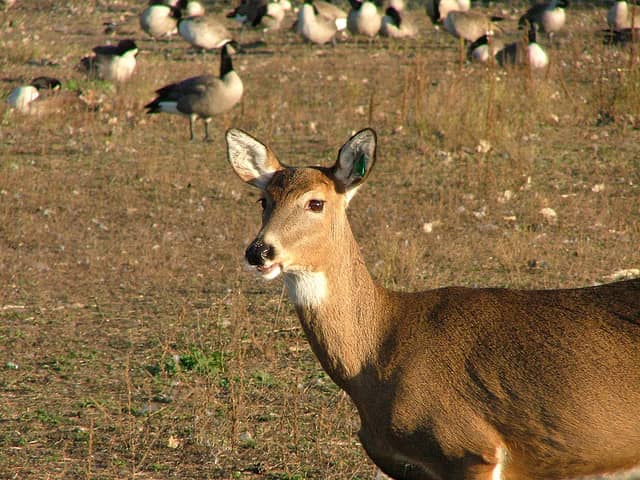The Baiting Controversy
Keith Warren 08.31.11

The golden color in the distance looked like a bright yellow paint splashed across the intersection. I know it was fresh because I saw it happen. There was no need to swerve to avoid the spill. It wasn’t paint at all.
Lying scattered on the ground was a 50 pound bag of corn. The trailer that lost the corn had been heavily loaded. When the single axle trailer tire hit the curb the bag was tossed on the road and spread for twenty feet. The spillage of corn happened at one of our busiest intersections in town. It was rush hour and traffic was so heavy that there was no way of cleaning it up. A little corn won’t hurt anything. Or will it?
I am sure that every deer hunter has seen such a sight. Corn is one of the mainstays of the Texas deer hunter. It is used as a bait to attract deer. But is baiting ethical? This question may have been asked by each driver that drove past the corn spill.
While deer hunters have been using corn as a hunting tool, animal rights folks and anti-hunters use corn as a reason to condemn us and our actions. Surprisingly, many hunters from outside Texas feel that “baiting” is unethical.
Using corn as a bait is legal in Texas and many other states. Corn is primarily fed in the winter and being full of carbohydrates, provides much needed nutrition during the lean months. Many other animals benefit from the corn. All kinds of song birds, squirrels, rats, rabbits, turkeys, hogs, coyotes and more will also eat the corn. Even snakes live around feeders as they feed on the mice and rats living near by.
There are lots of reasons why hunters use corn as bait. They can use the above reasoning to rationalize baiting, but those opposed to the practice will probably not be persuaded to the baiting side of the argument.
One reason why a hunter may use bait is that it provides a much better opportunity to carefully examine a deer before pulling the trigger. In many states where baiting is not allowed, young nubbin’ bucks (6 month old deer) are often mistaken for doe and killed, as the hunter couldn’t properly identify the animal. Another consideration is that the corn will allow the hunter a much better opportunity for a quick humane kill. That is every hunter’s responsibility.
Many non-hunters who oppose baiting also oppose hunting in general, so no reasoning in the world will ever convince them that baiting is acceptable.
I travel all over the country and hunt whitetails. In many states where baiting is illegal, hunters make fun of the practice, primarily questioning the ethics. I understand their objection until I see them hunting over a carrot patch, alfalfa or oat field or they focus on an area of woods that has lots of acorn-filled oaks. In these same states where baiting is illegal, hunters are allowed to grow corn in fields then cut the corn just before they hunt. The only difference is that they grew the corn rather than bring it in a bag. Baiting deer is a practice that will always be criticized, but it is extremely effective.
(Incidentally, I recently asked folks if they had a problem using bait to fish. No one objected to the idea for fish!)
As hunters, it is important to see how others view us. By doing so, it helps us be able to communicate what we do and why we do it. So when asked if I think baiting for deer is a good way to hunt – my response will be one that I use often, not just for this issue but for many other hunting & fishing related issues. “If it is safe, legal, ethical and will recruit more participants to the outdoors, then I am for it.”

